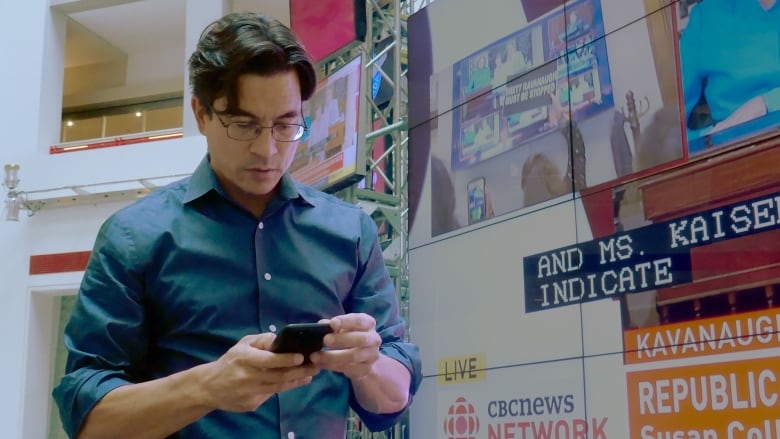Confessions of a smartphone junkie — or, what I learned from my digital detox
When Checkup host Duncan McCue tried to spend two weeks away from his phone, he only lasted seven days

I was in the middle of a quarrel with my teenage son over reducing his screen time when it dawned on me: the pot was calling the kettle black.
Smartphones are essential tools for journalists. From the moment I got it, the smartphone became an extension of my body — often in my hand, always in my back pocket.
As soon as my eyes fluttered open in the morning, I checked news and emails, even before heeding nature's call. I was on my phone all day at work, and when I lay down to sleep, I was scrolling Twitter in bed.
I wondered if the constant connectivity was turning me into the Borg, those terrifying alien mash-ups of man and machine in the Star Trek universe, linked together by their collective hive mind.
My misgivings about smartphone use heightened after I interviewed psychology professor Jean Twenge on Cross Country Checkup about her much talked-about study last November. It suggests that teens are sleep deprived because they spend too much time on their smartphone.
On average, kids use their smartphones 7-8 hours a day and the study found 40 percent of adolescents sleep less than seven hours a night. The constant wait for a 'like' on Instagram or a text message reply is taking a toll on teenagers' mental health, Twenge concluded.
Adults may not use smartphones as heavily as Generation Z — the cohort following Millennials — but the folks behind Moment, a free app that tracks your active phone usage, estimate people's average daily usage at four hours and five minutes, with more than 50 pickups.
It was time to take a long look in the mirror, and ask an embarrassing question: am I so addicted to my smartphone that I need a digital detox?
Online cravings
Lauren Bacon, a small business strategist and life skills coach from Vancouver, has plenty of clients who worry about being over-connected, and she believes a digital detox can help.
"It's really important that we get clear about what elements of the technology are causing us stress and a sense of imbalance," said Bacon.
Bacon has a background in the tech industry as a web developer, so she sees lots of positives about digital technology. For example, she lives far from her family and uses Skype or Facetime to stay in touch. A total break from tech would make her feel more — not less — disconnected.

But she says many of her small business clients report being stressed by immense volumes of emails and messages. They feel an urgent need to respond quickly to inquiries at all hours of the day.
Her approach: everyone needs to develop the muscle which allows us to set boundaries in our lives – and a digital detox may be a way to learn what is triggering you.
"The most hopeful thing about a digital detox is it allows you to really have an embodied experience of what it feels like to be without those distractions," Bacon said.
She suggests if you attempt a digital detox, be mindful of what you are experiencing and what you crave when you're offline. When you inevitably return online, learn to live with the technology in a way that supports you instead of driving you.
Resisting temptation
I tried my first digital detox while on Christmas vacation.
To my surprise, I read three books that week. Reading is one of my great joys and I hadn't realized my smartphone use had cut so dramatically into my book time.
I resolved to no longer let my phone control me. First, I turned off all push notifications. My phone no longer pings or vibrates, and I don't salivate like Pavlov's dog every time a new email lands in my inbox or someone 'likes' my posts.

Next, I did my best to put my phone away a half-hour before bedtime. I started charging it in a room other than the bedroom, so I wouldn't be tempted to peek in the wee hours of the morn.
This spring, I deleted the Facebook app. Then, I began making digital detoxes a regular, albeit brief, feature of my life. I broadcast on social accounts that I'm taking a break, and set up an auto-reply on email advising people I may not respond right away.
This summer, on my first day of holidays, I put my phone on airplane mode. I hoped I might be able to go two weeks without checking email, social media, or opening any apps.
I lasted seven days. Google Maps did me in, beckoning like a siren during a moment of disorientation on a northern Ontario highway. After The GPS Girl successfully guided me to my destination, I couldn't help myself.
I binged on Instagram for a day, convinced the masses would be delighted with photos of my blissful canoe trip.
But guess what? No one misses you much when you disappear for a week or two, the callus on my scrolling thumb was gone, and I felt good about not being glued to my phone.
Going tech-free forces me to ask: what do I really want in life?
There isn't always an app for that.
October 7 on Cross Country Checkup, we're asking: what does a digital detox mean for you? We want to hear about how you put down the phone and let go of technology. Tell us in the comments or email us: checkup@cbc.ca

